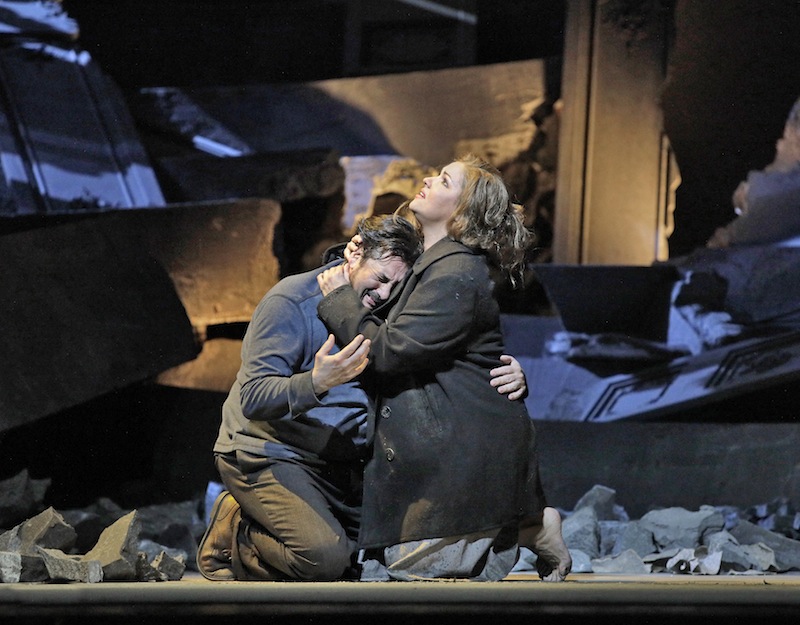Netrebko and Álvarez blaze in Met’s “Manon Lescaut”

Anna Netrebko and Marcelo Alvarez star in Puccini’s “Manon Lescaut” at the Metropolitan Opera. Photo: Ken Howard
Once in a while, it seems all that a dull staging needs is a new cast to give it a fresh take. The Metropolitan Opera hoped such would be the case with its revival of Manon Lescaut, injecting a dose of star power into Richard Eyre’s much-maligned production that opened last season from last year.
The results, in this case, were mixed. Anna Netrebko is as big a marquee name as exists in the operatic world, and a full house was on hand to cheer her on at Monday’s premiere. She still possesses a large voice and formidable presence; as her instrument has continued to fill out and darken and she has matured as an actor, it has become more and more difficult to take her seriously as an ingénue.
Much of the role of Manon Lescaut, of course, comes after her transformation from bright-eyed innocent to Parisian libertine. Netrebko’s sighing aria “In quelle trine morbide” in Act II ached with sadness, its sculpted lines betraying keenly felt passion and regret for having given up her true love, Des Grieux. The climactic “Sola, perduta, abbandonata,” was masterfully sung too, finding shining clarity at the upper end of her voice and smoldering power in her chest, all while Netrebko played the desperate final scene with total conviction. Yet that initial youthful innocence that is such a crucial part of the character’s arc was lacking, so Manon’s last pleas and reminiscences rang somewhat hollow.
Starring opposite Netrebko was Marcelo Álvarez, who gave a strong performance in the demanding role of Des Grieux. There is a heroic strain to his voice–one would not describe his sound as “effortless,” yet he combines natural, lyrical phrasing with an essential brawn, often to thrilling effect. “Donna non vidi mai,” his first major aria, was gloriously passionate, eschewing tender sighs for a full-throated expression of love-struck wonder, which fit perfectly into his vision of Des Grieux as a man immediately and singularly obsessed.
Christopher Maltman was luxury casting as Lescaut, Manon’s brother. Initially a slimy operator trying to get rich off of his sister’s good looks, Maltman’s Lescaut regained his dignity and became strikingly sympathetic as crisis revealed his deep affection for her. He brought a bellowing, full-bodied baritone to a role, where one usually encounters gruff veteran barkers.
Brindley Sherratt lent his imposing, gravelly bass to the role of Geronte, the powerful lech who seduces Manon. This is not a part with much nuance, but he dominated the stage with his malicious bearing. Among the smaller supporting roles, Zach Borichevsky stood out as the roguish Edmondo, his warm, woody tenor charming as he took over the tavern scene with his antics.
Marco Armiliato was absolutely brilliant leading the performance, drawing out every facet of nuance that Puccini’s varied score calls for. He found vibrant sparkle in the Prelude, muscle in the crowd scenes of Act I, raw intensity in the unraveling of Act II, cinematic grandeur as the couple were sent into exile. His imaginative, invigorating reading emphasized the character of the score and allowed the audience to hear the work as an early masterpiece on the edge of its composer’s greatest period. The Met chorus, naturally, sang with booming power.
The libretto-by-committee on which Puccini based the opera is, as has often been noted, something of a mess, pushing the central romance of the story off into the wings to serve as backstory for Manon’s eventual fall. Richard Eyre’s production hardly plugs the gap, more intent on chasing its ill-considered Casablanca conceit than on studying the relationship between the two main characters. This time around, at least, the camp in the scene at the docks has been toned down, allowing the parade of streetwalkers to have its emotional effect rather than being a floppy distraction. This is one of the few moments of true pathos in what is otherwise a flimsy caper of a staging.
Manon Lescaut runs through December 10 at the Metropolitan Opera. Kristine Opolais sings the title role on Nov. 21, Dec. 7, and Dec. 10. metopera.org